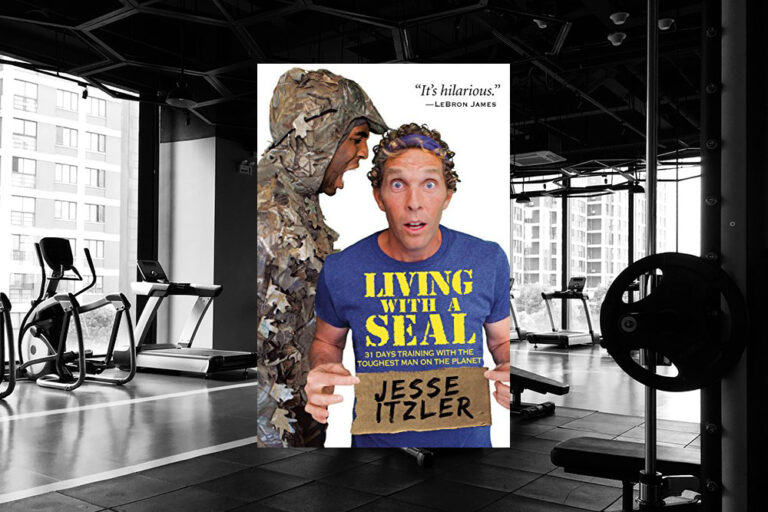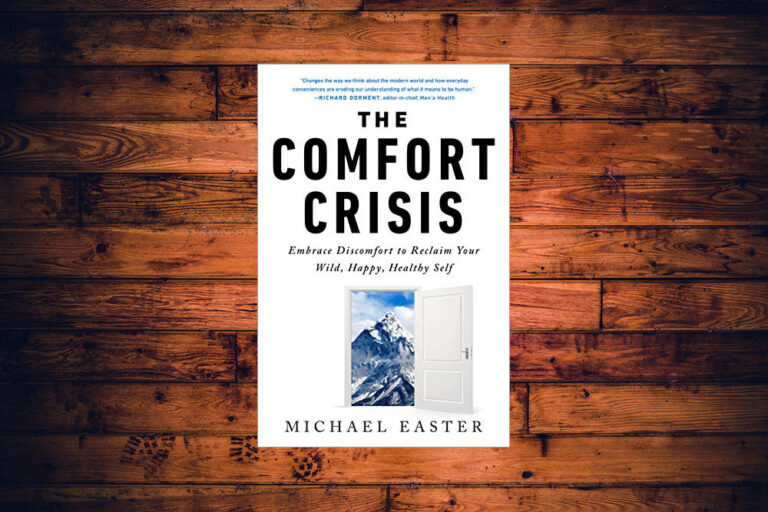#20: Developing Grit and Becoming Relentless. Lessons From Dean Karnazes’s Memoir “A Runner’s High” (Part 3)

In the final part of my notes from ultra-runner Dean Karnazes’s memoir A Runner’s High: My Life in Motion we’ll talk about developing grit and becoming relentless.
Achieving hard things in life often doesn’t require any special skills other than perseverance. Those who keep going for however long it takes are the ones who win most consistently and enjoy the most successful lives.
Let’s learn from Dean how to do that.
How to Achieve Hard Things in Life
There are two ways to get to the finish of an ultra. The first is to put your head down and grunt your way through it. I don’t know the other way.
Ultra is any race longer than a marathon. It starts from 50 km (31 miles) all the way to 100 miles (161 km) and sometimes even beyond.
For most people, a marathon alone is a huge, painful challenge. Now consider running even longer, and often in treacherous terrain. The suffering required to complete an ultra is well beyond what a regular person can even imagine.
Despite decades of experience with such long races, Dean’s strategy still depends on his willpower, or as he calls it, grunting your way through the race. No matter how good you are, grit is always the one key factor with a dramatic impact on your results.
As Dean writes later:
Oftentimes it isn’t talent that gets us someplace, it’s bullheadedness.
When we’re pursuing hard things or dealing with unexpected adversity, the same rule applies. Regardless of your preparation, the outcome often comes down to whether you can grit your teeth and keep going.
What choice do you make when things suck? Are you looking for an escape from the challenge or grunt your way through it?
Grit Takes Precedence
Over the period of a decade a new world order had emerged in ultramarathoning. Nearly every course record had been shattered in that time, and new faces were besting existing course records almost weekly. The depth of talent was deep and growing, and I was a grizzled vet straining to maintain a toehold in this sport I loved—a member of the old guard trying to keep pace.
It was demoralizing watching that young stallion bounding off into the distance, but it was reality. What little leg speed I once possessed was waning. No longer could I dependably downshift, boost the rpms, and motor up the side of a mountain the way I once could. Those days are over.
Though to my credit, I retained a certain grit. Age had slowed me, but it had also toughened me. I was no longer fast, but I was relentless. I steadily put one foot in front of the other and continued attacking the mountainside climb, step by deliberate step scaling the towering valley wall, determined not to waver.
Age might have slowed Dean down but compared to his young self, his mind is tougher than ever. True, he might not be winning races anymore against people half his age but his personal growth isn’t over. He’s still winning the most important race there is.
Grit is a key quality to cultivate throughout our entire lives. Even if our bodies don’t work as well as they used to, our minds can still keep getting stronger as we age.
But this isn’t just about running or lifting. Physical excellence is important but it’s one aspect of becoming an exceptional man. What takes precedence is your ability to persevere when the going gets tough regardless of the nature of the challenge.
I like to think about this as I do hard workouts or learn a new, difficult thing. Yes, I want to get fitter or acquire a new skill but the overarching goal is that through these projects I’m developing more grit.
Instead of focusing on pure physical training alone, think how it helps you become more relentless. While your physical preparation is important, in life we may also deal with academic challenges, a crisis in a relationship, or tough times in your business. With grit we can tackle them all.
Miracles Happen When You Keep Going
In those final few miles of running, I didn’t fatigue, didn’t exhaust, didn’t falter; if anything, I grew stronger. The human body is far from understood. If we can just suspend our skepticism and believe in miracles, sometimes they come true. Not long ago I was facedown in the dirt, unable to move; now I was running at a hardy clip, entirely resuscitated. Yes, miracles do happen.
Ultra-marathons are an extreme example of pushing one’s limits. During such a long, hard race, participants go from extreme ups to extreme downs, often in the span of an hour. Miracles, as the one described by Dean, often take place, demonstrating the unknowns of the human potential.
Going beyond the world of ultra-marathons, we can also experience miracles in our everyday lives. They’re smaller but important nonetheless. I’d even argue they’re more potent than the rare miracles in extreme situations. Why? Because you can engineer them daily, and what you do every day matters more than what you do once in a while.
How do you produce these miracles? It’s simple (but NOT easy): each time you feel like you can’t keep going, try to do it a little longer.
One more rep. One more minute in a stretch. One more topic to study. One more deep breath before you lose your temper. One more uncomfortable conversation before you give up on a relationship. One more call to a potential client, investor, or partner before you call it quits with your business.
Consistently postponing the moment you give up produces little miracles that slowly transform the way you see your limits. Suddenly the moment when you can’t keep going is just the first signal that things are about to get hard. It’s no longer a hard stop when it’s time to give up.
It reminds me of freediving when feeling the first urge to breathe doesn’t mean you’re about to black out. Instead, it means you’re about halfway through.
Does it mean it’s easy to ignore this feeling? Of course not. It’s incredibly hard. As an amateur freediver with no natural talent I have first-hand experience of it.
But over time, as you try to push past that moment, even if for just a split of a second, a little spark flies off, creating another miracle: the wonder of stretching your limits.
You Win With Patience
Patience, I told myself. Patience. Respect the distance, take each breath purposefully, make every step count, calculate the surges, watch your heart rate, stay hydrated, maintain your calories. Do all of these things continuously while remaining incorruptibly patient. An ultramarathon moves slowly very quickly.
Yet again, what applies to an ultramarathon applies to life, too. Often the only difference between a winner and a loser is that the winner was patient for a little while longer.
Patience is a valuable everyday skill. It allows you to stay calm in a stressful situation, delay gratification, and make better decisions.
Many pursuits in life come down to fundamentals that we repeat over and over again. Those who can’t exhibit self-control in the face of slow progress make rash decisions that sabotage their efforts.
It’s tempting to go faster or cut corners but you can’t rush certain things.
For example, you can’t run a marathon without preparation. Your joints, ligaments, tendons, muscles, and bones need to adapt to the demands of long-distance running. Try as you might, if you rush the process, you’ll end up injured and further away from your goal.
Without patience we become impulsive and careless. A sense of urgency helps in life but we must balance it with deference, respecting that sometimes we can’t control when we get the results we’re after.
How to Develop Endurance
The lessons you learn from running translate to life. The runner has a strong body and a strong heart. You get knocked down, you pick yourself back up, dust off, and keep going, only to get knocked down again, only to pick yourself back up once more and continue on, arising one time greater than toppling. And in this persistent enduring you acquire endurance. Your permanence is established in this way because you do not unseat easily, you have what it takes to withstand setbacks. You may waver and misstep, but you never give up. No matter how daunting the obstacle, you forge onward and keep chipping away until that barrier is eventually obliterated and overcome.
I couldn’t have found a more fitting quote to end my series of articles on Dean Karnazes’s memoir A Runner’s High. As I mentioned a few times, the book may be about running but in reality it’s about life.
Endurance, grit, patience, relentlessness—these words may have slightly different meanings but they all represent the same thing: staying hard when things get hard.
We all face obstacles and get knocked down. We may not enjoy hitting our heads against these barriers but these barriers also forge us.
Adversity should become a friend rather than an all-powerful enemy to escape from. As Randy Pausch said:
Because the brick walls are there to stop the people who don’t want something badly enough. They are there to keep out the other people.
When you get knocked down, pick yourself back up. Identify your obstacles. Overcome them. Win. Get better. Never stop.
Questions to Ponder
1. Are you capable of grunting your way through things that suck or do you quickly give up?
2. When pursuing personal growth, do you focus on cultivating meta-qualities like grit?
3. Have you ever experienced any miracles after pushing yourself beyond what you thought you were capable of doing?
4. On a scale of 1 to 10, how patient are you? How could you practice calmness when things go slowly?
5. How do you interpret obstacles in your life? Do you always pick yourself back up when you get knocked down?
If you want more advice on how to develop grit and become relentless, sign up for a free weekly Discomfort Club newsletter. Enter your email address below:





